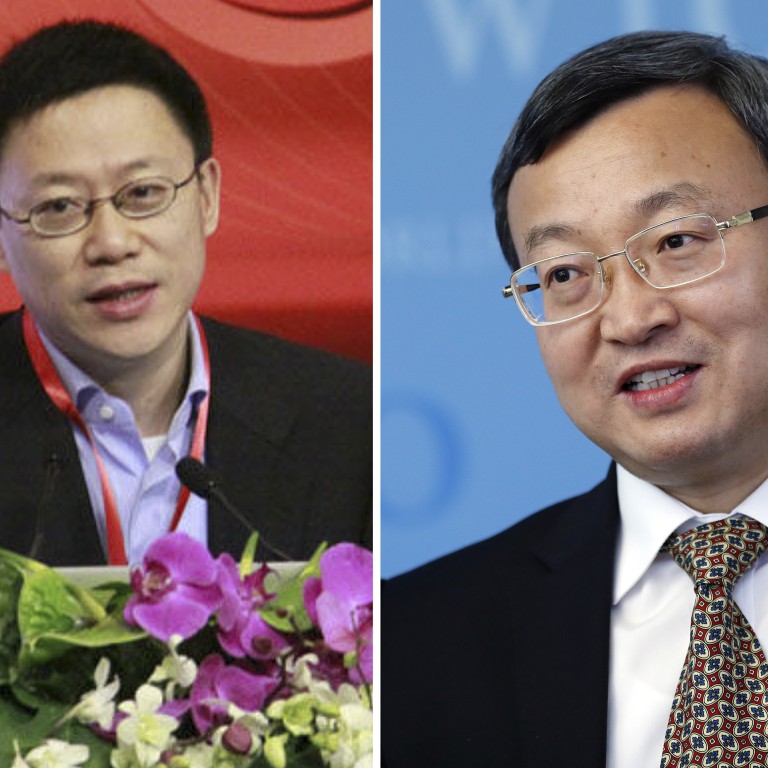
China, US ‘less belligerent, more cordial’ as delegation heads to Washington before Liu He
- Commerce Vice-Minister Wang Shouwen and Finance Vice-Minister Liao Min are expected to arrive in the US on Monday, Bloomberg reports
- Both sides appear committed to reaching a deal before March 1, analysts say
China and the United States appear committed to reaching a deal before March 1, when the trade war truce ends, even if they have not resolved differences over key issues such as forced technology transfers and Beijing’s state subsidies, analysts say.
That delegation – led by Commerce Vice-Minister Wang Shouwen and Finance Vice-Minister Liao Min, two of Liu’s English-speaking aides – is expected to arrive in Washington on Monday to lay the groundwork for those talks, Bloomberg reported on Friday, citing sources.
The visit comes as staffing levels in the US administration, including the Office of the US Trade Representative, are down to a minimum amid a government shutdown.
China’s commerce ministry, which is coordinating the trade talks, has yet to confirm Wang’s trip to Washington. But ministry spokesman Gao Feng on Thursday denied reports that the US had rejected the visit by Chinese deputy ministers, saying Beijing and Washington were in “intense communication” over Liu’s trip. He said the trade talks at the end of the month aimed to “implement the important consensus reached by the two countries’ leaders”, referring to the agreement reached by Chinese President Xi Jinping and his US counterpart Donald Trump in Argentina on December 1.
Beijing’s remarks came a day after Larry Kudlow, head of the National Economic Council, also said reports that the US had turned down Chinese officials’ travel plans were untrue.
Eleanor Olcott, a China policy analyst with research firm TS Lombard, said rhetoric from both Beijing and Washington had been “less belligerent and more cordial in the run-up to these talks” with officials “keenly expressing optimism for the negotiations to culminate in a deal”.
At the same time, “such optimism is not evidence that we are close to a deal, as the official line would like us to believe”, she said.
Ren Xiao, an international relations professor at Fudan University in Shanghai, said the plan to send vice-ministers to Washington showed Beijing’s determination for Liu to reach a deal when he meets US Trade Representative Robert Lighthizer and Treasury Secretary Steven Mnuchin.
“China is going to make bigger concessions this time,” he said, adding that he expected the two sides would find the common ground needed to get a deal to announce by the end of the talks.
For now, details of the negotiations are under wraps. But among their key differences are structural issues – Washington asking Beijing to change its approach to developing China’s economy – while Beijing has already started buying more US products to reduce the trade deficit, another US demand.
The general consensus is that Beijing and Washington will reach a deal before March 1 to avoid any escalation of the tariff war. If a deal is not reached, the US will raise tariffs on US$200 billion of Chinese products to 25 per cent from 10 per cent, followed by more retaliation from China – actions that would roil global markets and hurt economic growth.
How China misread the US on trade during Donald Trump’s early days, according to Ronnie Chan
“For Trump, it’s quite necessary to seize the opportunity and reach a deal [with China],” Ren said. “He could lose votes [in the next election] if the trade war drags on.”
John Quelch, dean of the Miami Business School at the University of Miami, said a deal between Beijing and Washington would be more of a road map for future talks.
“By March 1, there will be a deal, but not a final resolution,” said Quelch, who has worked at the China Europe International Business School in Shanghai. “It will be a road map – a road map with a timeline to resolve thornier issues such as forced technology transfer … and state subsidies.”
Olcott at TS Lombard said even if a deal could not be reached by March 1, the likely outcome would be an extension of the deadline rather than an immediate escalation of the tariff war.
“There is a strong economic incentive on both sides to avoid tariff escalation amid a slowing global economy,” she added.
Additional reporting by Amanda Lee



